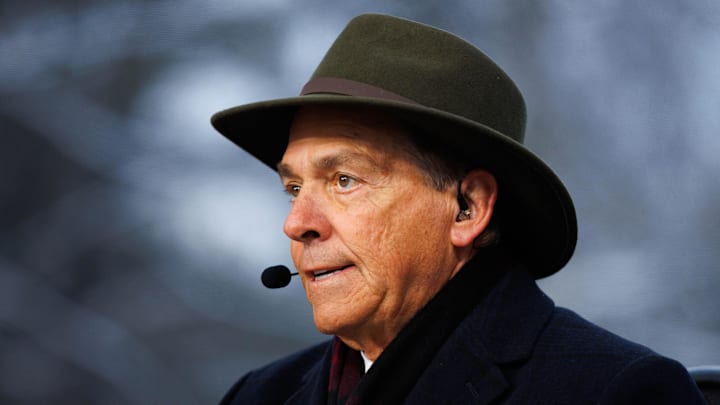Does College Football Need Commissioner Nick Saban? Not So Fast.

Every year during the College Football Playoff, there tends to be a story line that takes on a life of its own as the confluence of extensive media availability and coaches unwilling to give an actual answer about their opponent produces some talking point seemingly out of nowhere.
This season, it appears that story line is about the growing movement to have Nick Saban named as some sort of college football commissioner.
Blame James Franklin for starting it, with the Penn State Nittany Lions coach suggesting the idea Sunday ahead of the Fiesta Bowl against the Boise State Broncos.
“I think one of the most important things we can do is, let’s get a commissioner of college football that is waking up every single morning and going to bed every single night making decisions that’s in the best interest of college football,” Franklin said. “I think Nick Saban would be the obvious choice if we made that decision. Now, Nick will probably call me tonight and say, ‘Don’t do this,’ but I think he’s the obvious choice, right?”
It didn’t take long for the concept to spread. Georgia Bulldogs coach Kirby Smart said it sounded fine to him on Monday morning. Notre Dame Fighting Irish coach Marcus Freeman said more leadership is never a bad thing. The Oregon Ducks’ Dan Lanning was supportive in general.
The prompt for a Saban appointment is rooted in issues the sport has been turning in knots to sort out.
NIL. The transfer portal. Looming revenue-sharing. A calendar that crams everything into a handful of tight windows, most inconveniently during the holidays.
It’s a lot to deal with and a pain being felt far and wide. From FBS powers to FCS climbers, from those same coaches to the players leaving their teams in the middle of playoff runs, from the lowest-level recruiting staffer to the highest-paid athletic director.
All apparently hate what college football has become, the lovable chaos ever present on the field now becoming a constant thorn off it.
“I think a commissioner would be a nice thing in theory, but what can they effectively get done?” Smart said. “Nick would be great. I know he’s a huge advocate for college football. He wants to make it better. He’s always been a person that believed in leave it better than you found it, and I have a lot of respect for the way he does it.
“But I’m probably not the guy that can tell you what a commissioner can and can’t do in terms of making it a better process for all of us.”
That’s a theme repeated as each playoff coach has chimed in with answers that are almost totally self-serving and largely out of touch with the larger industrial complex in college athletics that, to be fair, is trying to address those complaints.
At next month’s NCAA Convention, hundreds of administrators will gather to vote, debate, discuss and advance solutions. The agenda is lengthy and dense, to say nothing of the ongoing chatter that will take place a week later in Atlanta as the CFP brain trust navigates several changes for 2025 and beyond.
The coaches, though, get the biggest megaphone to complain and drive the narrative that things are simply broken. Perhaps that’s a consequence of having the biggest salaries around, an exclusive club with an eight-figure entry fee just for the right to whine and yell without consequence.
The thing is, any suggested solutions are often furthest from the mark.
Start with Saban taking over as some sort of CFB czar.
The concept of a dedicated college football overlord is nothing new and seems to pop up every six months or so. Throwing the former Alabama Crimson Tide coach’s name into the mix makes sense on the surface. He’s retired from lording over the sport on the sideline, and he’s been well received as a newfound conscience on such issues as part of his role on ESPN’s College GameDay.
He’s also vastly unqualified and uneducated on how to actually get s--- done beyond cursing about it on TV. Do you think he knows how a rule goes from an emergency proposal to a bylaw with the Division I Council?
I’ll save you the trouble: Nah.
That’s not to say he couldn’t come to understand such nuances—Saban is perhaps one of the few folks imminently capable of applying himself to the job and bringing enough gravitas to actually build consensus around solutions.
“Sure, it would be great to have one, I guess,” Lanning said. “I would say this. Nick is a great advocate for the game. He obviously understands what’s good for football. So I think that he has a great voice for college football.”
He’s also 73 years old and got out of the business because of those same issues he supposedly would be in charge of fixing. Plus, legend or not, he’s still a coach at heart and all but certain to approach fixes from that viewpoint.
A bold and innovative outside-the-box hire is probably not going to be the best descriptor for the guy who eats the same lunch of oatmeal cream pies everyday.
The same goes for the others who typically get brought up for a similar role, from Condoleezza Rice to Oliver Luck.
Most are smart to enjoy their names remaining relevant as power players in the sport, while avoiding such responsibilities that would come with a no-win gig.
It’s hard enough to navigate such choppy waters if you’re already a powerful figure like SEC commissioner Greg Sankey—just imagine trying to be his boss and telling him what to do.
It won’t go well, just like the concept of an ever-encompassing figure trying to guide college football to a better place.
“I don’t believe there’s just one answer to truly fix or enhance college football and college athletics. But I do believe we’re progressing,” Freeman said. “I believe every year you’re seeing enhancements and decisions made that I think everybody has the mindset of how do we make this thing better, and I foresee it continuing to improve.”
That will happen naturally over the coming months and years. Figures like NCAA president Charlie Baker or Smart’s own boss—Georgia athletic director Josh Brooks, who is on a host of key football committees—are doing what they can to bring about change sooner rather than later.
But college football is inherently flawed. Always has been, always will be.
No czar or grand pooh-bah will change that, even if it will give all the coaches a new target to unleash their ire upon every December when the time comes to complain about things once again.
